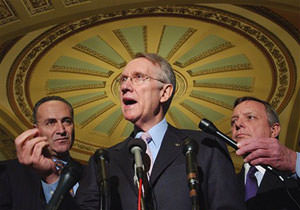The Party of Choice
By acting on their convictions rather than their fears, the Democrats could ultimately find that the public option can be turned to their advantage for years to come.
The Senate leadership’s decision to include the “public option” in its health care reform legislation seemed at first almost miraculous, especially to anyone who believed the hundreds of obituaries recited in the media over the past several months. But by acting on their convictions rather than their fears, the Democrats could ultimately find that the politics of consumer choice can be turned to their advantage for years to come.
Prognostications by the Washington press corps are so often wrong that it is usually safe to bet against the pundits — but in the case of the public option, their skepticism was warranted. While polls have consistently showed strong majorities in favor of a Medicare-style insurance plan, the combined opposition of the Republican minority, the right-wing media, and the insurance and pharmaceutical industries appeared easily powerful enough to kill any such proposal.
Besides, too many influential Democrats in both the Senate and the House — notably Connecticut’s Joseph Lieberman, whose wife long worked for major health care and pharmaceutical interests — took their direction from lobbyists who want to kill the public option. (Lieberman, the self-styled “independent Democrat,” has threatened to join a Republican filibuster.) Meanwhile White House political operatives were sending mixed messages, with President Obama’s support for the public option subordinated to the illusion of bipartisanship. Propaganda against “government-run health care” has been dominating the debate.
But prospects for the public option brightened when Democrats led by Sen. Charles Schumer fashioned a compromise that would allow states to “opt out” of the public insurance plan. By leaving that decision to the states, the Schumer amendment recapitulates the political theme of choice in health care reform. Suddenly, Republican opposition to the public option can be seen for what it really is: curtailing consumer choices and coddling insurance monopolies.
The reason that Schumer’s scheme is superior to other compromises is simple. Unlike feeble alternatives proposed by some of his colleagues — all of which would delay implementation indefinitely, or diminish the public option’s scope — the opt-out plan would allow for success in the real world. As the default position, requiring specific action to reject the government plan, the public option will have a strong chance of prevailing in most states. And should most states actually permit the public option to be offered alongside private insurance, the government plan will wield enough market power to reduce costs significantly across the board, just as its proponents expect.
Of course, there probably would be a number of states where Republican governors and legislatures decide to opt out, at least initially. Sadly, the places that most need the public option, such as Mississippi, where insurance monopolies create both poor coverage and poor health, are the most likely to reject it. But over time, if the government plan proves to be cheaper and better than the private monopolies in those states, the demand for change will intensify.
Then families will learn that their friends and relatives in public option states are paying hundreds of dollars less every month for the same coverage (or better). Consumer agencies will report that the government plan, like Medicare, doesn’t abruptly cancel insurance for people who become ill or chisel their benefits as private insurers too often do. Business owners will discover that firms in public option states have lower costs — because even companies with private insurance plans benefit from the competitive effect of the government plan.
In a democratic society, this experiment — again assuming its success — should result in growing pressure on politicians who insist on frustrating progress. It is hard to imagine an issue that could more sharply frame the division between consumers and labor on one side, and abusive corporate power on the other. Over time, for struggling Democrats in Republican states, that could mean becoming the party of choice in every sense.
Joe Conason writes for the New York Observer.
© 2009 Creators.com
Your support matters…Independent journalism is under threat and overshadowed by heavily funded mainstream media.
You can help level the playing field. Become a member.
Your tax-deductible contribution keeps us digging beneath the headlines to give you thought-provoking, investigative reporting and analysis that unearths what's really happening- without compromise.
Give today to support our courageous, independent journalists.






You need to be a supporter to comment.
There are currently no responses to this article.
Be the first to respond.